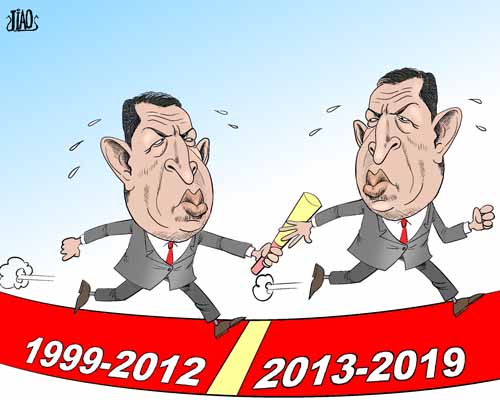The victory in Venezuela
- By Heiko Khoo
 0 Comment(s)
0 Comment(s) Print
Print E-mail China.org.cn, October 10, 2012
E-mail China.org.cn, October 10, 2012
 |
|
[By Jiao Haiyang/China.org.cn] |
The re-election of President Hugo Chávez in Venezuela is a victory of world historic importance. Since Chávez was first elected in 1999, Venezuela has been transformed from an extreme form of capitalism into a semi-planned economy based on revolutionary democracy. This revolution radically improved the lives of the majority of the population and emboldened the forces for change throughout region.
The new Venezuela provides free health care and education, subsidizes food and cheap housing, supports land redistribution and experiments in workers' control, and promotes an independent anti-capitalist media. This transformation is based on the nationalization of key sectors of the economy. The list of radical and progressive social and political reforms goes on and on.
Venezuela's efforts to improve the educational level of the masses have been truly impressive. One extraordinary program called "El Sistema", currently teaches over three hundred thousand children to play classical music instruments, in a collective learning environment. Their lead orchestra is now considered to be the most dynamic and exciting in the world. Although El Sistema predated the revolution, it is now directly supported by the state. Its success reveals the capacity to awaken and realize human potential.
It is not hard to imagine that the energy and enthusiasm of the masses can somehow be unleashed in a similar fashion, and that this could produce collaborative planning for their communities, and for society as a whole. This collective orchestra of the people would elevate the human spirit, and foster a sense of universal collectivity, participation and progress.
The politics of Hugo Chávez evolved from revolutionary democracy to socialism over the last 13 years. The decisive change occurred in April 2002, when a US backed coup-d'etat removed Chávez from office, and a revolutionary uprising brought him back to power.
In some ways, the most fortunate circumstances for socialist development exist in Venezuela, because it has the world's largest known reserves of oil. Oil finances the social programs called "missions" that have anchored reforms in the everyday lives of the people. Oil enabled Chávez to extend support to Cuba and to other leftward leaning political forces, all over the continent and beyond. Hilariously, Venezuela even provided support to the poor of the United States, through subsidies for heating oil in winter.
However, oil states are often riddled with corruption and a deformed economic structure, with the oil industry providing incredible wealth for a tiny elite, but leaving a huge proportion of the population in penury, eking out their existence in the informal economy. The problem of transforming this informal economy into formalized, integrated and organized societal power, is one of the most fundamental issues that has plagued the Venezuelan revolution.
Chávez often attempted to overcome this problem by appealing to revolutionary spirit and engagement; for example, he empowered local community councils to take command of resources and planning from the intermediate state administration, that had often blocked progress. In many cases, empowerment of the masses brought significant improvement, but conflicts between the people and the bureaucracy multiplied, and new structures produced new opportunities for mismanagement and corruption. This demoralized and alienated many grass-roots socialists who point to the phenomena of a corrupt "red-hat bureaucracy".
Another important attempt to overcome the tendency to informality, was to launch the mass membership United Socialist Party of Venezuela (PSUV) founded in 2007, but it often came to rely on military like mobilization as the means to attain its objectives. The strength of the PSUV can be seen in its capacity to galvanize supporters to vote and attend mass rallies, but this is distinct from the development of the productive capability of the economy and society.
The lack of long-term planning means that decision-making is eclectic, being based on reaction to the clash between state policy and market responses. This conflict often finds its expression in the form of sabotage by the middle and upper classes, and outbursts of anger by the workers and the poor. Venezuela's dual exchange rate (an official and black-market rate), price controls over foodstuffs, and similar measures, cannot act as a long-term substitute for technical, scientific and general development of the productive forces. The act of establishing effective planning mechanisms at the core of the economy, will help to identify the resources that need to be secured by nationalization or the development of new and expanded public enterprises.
When Chávez signed a US$42.5 billion financing plan with China in 2007, he said, "the world's second-biggest oil user, needs energy security and we're here to provide them with all the oil they need." The money is channeled through the China-Venezuela Joint Investment Fund. It was used to build the Simón Bolívar Satellite, it builds roads, railways, and houses for the masses, and it finances a range of major infrastructure, social development, energy, mining and agricultural projects. Chinese state-owned enterprises have been contracted to carry out key projects. China's involvement has acted as a powerful impetus towards adopting a more planned approach to Venezuela's economic development, which will produce a stronger and smoother trajectory of growth.
This collaboration was an important factor in ensuring that the revolutionary aspirations of Venezuela's leadership were turned into concrete development projects, rather than lost in the mire of bureaucratic corruption, that unfortunately, often hindered the implementation of infrastructure projects in the past. Hugo Chávez's revolution can now escape from the economic distortions caused by its oil dependence, and Venezuela can continue to act as a beacon of hope proving that another world is possible.
The author is a columnist with China.org.cn. For more information please visit:
http://www.china.org.cn/opinion/heikokhoo.htm
Opinion articles reflect the views of their authors, not necessarily those of China.org.cn.






Go to Forum >>0 Comment(s)